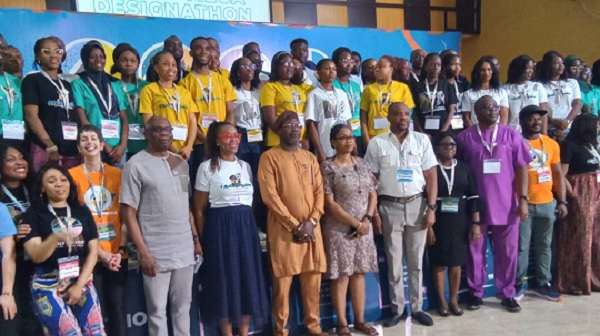
Youths from different healthcare fields including Medicine, Pharmacy, Nursing, Laboratory Science, and others have embarked on a mission to innovate homegrown solutions to address and prevent different health challenges in Nigeria, such as hypertension, stroke, HIV/AIDS, cervical cancer, liver cancer, and to drive HPV vaccine up. The initiative, tagged “Mega Designathon 2024”, is driven by Nigerian scientists in the Diaspora from Washington State University, and the University of North Carolina, in collaboration with researchers from the Nigerian Institute of Medical Research (NIMR).
Addressing the youths numbering up to 140 at the official opening of the programme, held at the NIMR Main Auditorium on Wednesday, Director General, NIMR, Prof. Babatunde Lawal Salako, justified the motive behind the innovative contest, saying it is to ensure acceptability of healthcare solutions by end-users. He explained how scientists had suffered setbacks in the past in convincing patients about the potency of their research outcomes, merely because the users were not familiar with the system that produce the result.
Thus, in resolving this challenge, he noted that the research team from Washington State University, the University of North Carolina, and NIMR, came up with an idea of developing local solutions to health issues, through those people who will use the products. For instance, Salako said since it was discovered that there is apathy to HIV testing among young people, they brought a group of youth together who invented HIV self-testing kits, which will prevent stigmatization and all sorts of issues associated with HIV screening. And it has been effectively embraced by most secondary school students and undergraduates.
For the 4-Day Bootcamp, which runs from 3-6 April, the NIMR DG said their focus will be on four projects namely, cervical cancer and HPV-related cancers, liver cancer and hepatitis, importance of HBV vaccination uptake among newborns, and call to action for our youths, our future leaders, to take the reins in the fight against HIV.
The four groups to deliver these concepts, he note, are : 4YBY Team, to be coordinated by Dr Ebenezer Adeoti and Dr Jane Okwuzu; 4C Team, to be led by Dr Abideen Salako and Shayna Muller; 4MB Team, to be guided by Dr Abideen Salako and Shayna Muller; and Music 4 Health Team, to be coordinated by Chidi Okafor and Dr Ifedoal Olojo.
“Often times, when we come up with solutions that are designed only by researchers, the community don’t accept it.
“The policy makers don’t accept it because they don’t know about it or because they are not part of it. So we have to start another round of advocacy to get them to understand why they need to use our research results. But the approach we have taken is now about those who will use the research results.
“The young people that we are bringing together here today are the ones that will be the end users of whatever research product that we are able to provide. And in this situation, like the one we have done in the past was about HIV self-test to improve detection and reduce the risk of HIV. And we decided to take it to the young people because they are the ones in the heat of it”, he explained.
The Lead Investigator of the project, Dr Juliet Iwelunmor, Washington State University, buttressed the objective of the programme, which seeks to bring local creativity and invention to bare in tackling some Nigerian health problems. She asked a fundamental question concerning the lifestyle of Nigerians saying if Nigerians as a people eat local food, put on local clothing, and engage in indigenous occupations, then why do they seek foreign solutions to their health challenges? She said it was this question that triggered the establishment of Mega Designathon 2024, aimed at inventing local remedies for ailments in Nigeria.
Iwelunmor disclosed that they have about 40 teams of youths within the age range of 19 to 24, saddled with the responsibilities of producing innovative ideas to motivate mothers to vaccinate their newborns with HPV vaccines; ensure that no Nigerian youth is HIV positive; use music to drive awareness and prevention of hypertension and stroke; among others.
According to her “All our creativity is local. The food we eat or the clothes we wear, everything we do is local. It’s our own.
“So how much less our health? We know what works best for us. So that’s why we are gathered here. We are gathered here to say no solution is too small, no solution is too big. Some solutions may fail but some solutions will also succeed. The key is that you have to bring it.
“We are here asking our youth, asking our community-based organisations, asking just everybody that has a handle on health, that has experienced health, that wants to learn, to bring those solutions and together we will create what we know will work best for us.
“It’s not enough to go elsewhere and say let’s imbibe other people’s food, other people’s culture, when we know what works for us. So that’s why we are gathered, to ask people in general, what are those solutions for increasing HPV vaccination uptake? Do you know what will work best so that more girls, for example, are vaccinated? Please bring it”.
Prof, Oliver Ezechi, co-investigator of the project with NIMR, highlighted on the intricacies of the project, the selection criteria, how they were able to screen over 1000 applications to just only 140 participants for the first phase, thereafter, to select those who will proceed to the final stage in June.
We have over a thousand teams, he said, “What do you think should be the solution? For each of those, be it cervical HPV, be it stroke, we’ll ask specific questions. How do you think we can improve the uptake of human-contaminated virus in the community? And then they’ll come up with different solutions. How do you think we can improve stroke awareness, and people to realise any one signs of stroke? Then they young people came up with different responses to those questions, which we are here to refine”.
A few of the participants who spoke with Pharmanewsonline expressed their delight in participating in the Mega Designathon, with high hopes of gaining new insights and becoming becomes innovators in the nearest future.
In a chat with a Nursing student of Lead City University, Miss Precious Adesewa, she disclosed that she and her team are working on the promotion of HIV self-testing, among youths of age 19 to 24. “Since it’s a challenge for most young people to walk into a hospital for HIV testing, we aim at developing more acceptable means for HIV testing for this group of people” she noted.
Another participant, Miss Jennifer Ekuma, a Pharmacy intern expressed her excitement about the programme, while appreciating the organisers for the opportunity to partake in such elevating training. I hope to see myself occupy bigger stages and be a renounced change-maker in the nearest future, she stated.











